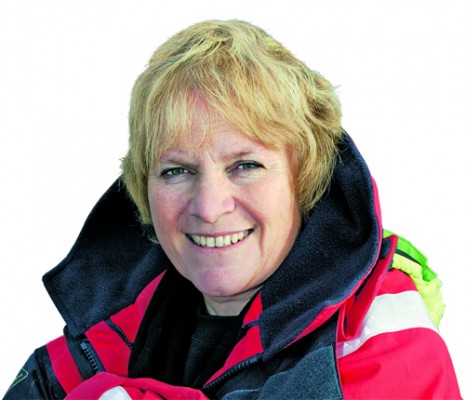Libby Purves February podcast: Why do sailors earn so much less than cyclists? We’ve got
a unique skill set that would wow any management guru
“We can create hot meals out of leftover food, even when it has been sat on”
Oh dear. A report finds that people who play organised, competitive team games earn half a million pounds more over a lifetime than people who don’t. Triathletes do best, then cyclists, rowers, cricketers, footballers, rugby, lacrosse, squash, netball… These things apparently teach communication, teamwork, confidence, and enable you to ‘deal with criticism’ better.
The report doesn’t mention sailing. If it did, you can bet it would only be fierce racing that they reckon raises abilities, character, earning power and the rest. It’s a bleak outlook for us cruising types: not only doomed to pay out through every orifice on ruinous bits of stainless steel and antifoul paint costing more than VSOP brandy, but less likely to earn shedloads of money to do it with. Sad.
But it did set me musing on what it is, character-wise, that we gain from thrashing or drifting around in boats. I often quote Belloc – ‘There, sailing the sea, we play every part of life; control, direction, effort, fate; and there we can test our- selves and know our state.’ Or Adrian Seligman’s beautiful reflection that a sailing ship is ‘one of God’s most patient, yet most steadfast and courageous creatures… those who live with her, learn from her in time.’ Which is splendid, though in the corporate world being patient, steadfast and courageous doesn’t increase your earning power.
So what do we learn? A bit of courage, certainly, and a gloomy tendency to plan for the worst (wind shifts, tide rips, boatyard bills). We have a higher tolerance of odd smells and unbecoming thermal underwear than most – all those rugby and squash types have freer access to showers – and we are fantastically inventive with instant repairs and adaptive travel plans: ‘Crew change at Brest cancelled, mate, can you get yourself to L’Aber Wrac’h?’ We can create hot meals out of leftover food, even when it has been sat on.
Consider our sailing heroes and what makes them great. We can emulate the diehard refusal to retire exemplified by the great Sir Robin Knox- Johnston, managing a tight third place against all those sprauncy young singlehanders in the Route du Rhum. Admittedly, he was racing. But turn to the cruisers, and there’s HW Tilman: I edited the digest of his sailing voyages years ago and – for all the cantankerous qualities – loved him for his toughness, determination, and adherence to Drake’s dictum: ‘There must be a beginning of any great matter, but the continuing unto the end until it be thoroughly finished yields the true glory.’ Further down the scale, I consider my husband Paul a bit heroic for having decided to sail to the Beagle Channel and Cape Horn, and actually doing it.
Some of the Tall Ship masters, mates and bo’suns display leadership qualities any employer should jump at (provided they’re willing to take a land job). Even the achievement of keeping a family-and-friends crew safe and reasonably happy over a fraught weekend in the Channel is a more subtle managerial achievement than just motivating some fit rugby team, none of which is actually vomiting at the time…
The other great proof of the employability of cruising sailors is that, of all workers, we absolutely know how to switch off professional fretting and liberate the mind for a while, which any management guru can tell you is vital to creativity and energy. The former BBC Director-General Sir Ian Trethowan – not a particularly confident sailor, but a keen one – confided to me once that ‘The moment I drop the mooring, nothing else matters – not the BBC, not the license fee, not anything at all – except the problem of getting safely back on the mooring again that night’.
Libby Purves




